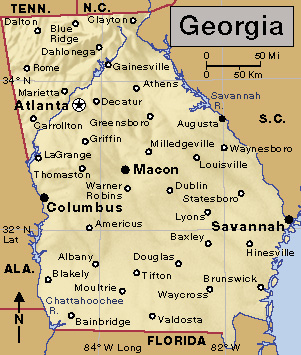Columbus, Georgia (pop. 206,922; met. area pop. 328,883), is one of the largest cities in the state. Columbus is an industrial and military center. It lies on the Chattahoochee River, which forms Georgia’s southwestern boundary with Alabama.

The city’s chief industries include banking, credit card processing, insurance, and the manufacture of textiles and snack foods. Fort Moore (formerly Fort Benning), the home of the U.S. Army Maneuver Center of Excellence, adjoins Columbus to the south.
A 28-block national historic district in downtown Columbus includes many historic homes from the 1800’s. The state theater of Georgia, the Springer Opera House, was built in Columbus in 1871. The city is the home of Columbus State University. The National Infantry Museum and Soldier Center is at Fort Moore.
In the early 1900’s, the Columbus industrialist W. C. Bradley helped to develop the soft drink Coca-Cola into an international product. The Bradley-Turner Foundation, supported by profits from Coca-Cola stock, has funded the Columbus Museum, the National Civil War Naval Museum, the Coca-Cola Space Science Center, and many other cultural institutions and activities in the city.
Creek, or Muskogee, people lived in what is now the Columbus area before white settlers arrived. Two major Creek towns, Coweta and Cusseta, were early trading centers for the English, Spanish, and French. Columbus was founded as a planned community in 1828 at the northernmost navigable point of the Chattahoochee River. The river powered the city’s cotton mills, the first of which opened in 1838. Textile manufacturing dominated the city’s economy into the second half of the 1900’s.
In 1971, Columbus and Muscogee County were consolidated under a mayor-council-manager form of government. Columbus was the first Georgia city to adopt a consolidated city-county government.
See also Columbus State University; Fort Moore; McCullers, Carson; Rainey, Ma.
